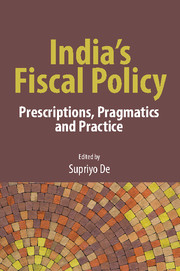Book contents
- Frontmatter
- Contents
- Foreword
- Acknowledgements
- Disclaimer
- Introduction: Contours of the Indian Fiscal Policy Debate
- 1 Fiscal Policy in India: Trends and Trajectory
- 2 Decentralization, Indirect Tax Reform and Fiscal Federalism in India
- 3 Fiscal Implications of Energy Subsidies
- 4 Fiscal Implications of Food Security in India: A Critical Review
- 5 Land and Food Acts: Trading Economic Pragmatism for Political Gain
- 6 A Separate Debt Management Office in India
- 7 Show Me the Cash: Direct Benefits Transfer in India
- 8 India's Education Challenges: Expenditure Effectiveness Issues
- List of Contributors
- Index
5 - Land and Food Acts: Trading Economic Pragmatism for Political Gain
Published online by Cambridge University Press: 23 July 2017
- Frontmatter
- Contents
- Foreword
- Acknowledgements
- Disclaimer
- Introduction: Contours of the Indian Fiscal Policy Debate
- 1 Fiscal Policy in India: Trends and Trajectory
- 2 Decentralization, Indirect Tax Reform and Fiscal Federalism in India
- 3 Fiscal Implications of Energy Subsidies
- 4 Fiscal Implications of Food Security in India: A Critical Review
- 5 Land and Food Acts: Trading Economic Pragmatism for Political Gain
- 6 A Separate Debt Management Office in India
- 7 Show Me the Cash: Direct Benefits Transfer in India
- 8 India's Education Challenges: Expenditure Effectiveness Issues
- List of Contributors
- Index
Summary
Introduction
The early 1990s marked the beginning of an economic transition in India. The state began withdrawing from the various key spaces it occupied in production with new regulations encouraging allocation of resources on market-driven principles. The policies continued through the 1990s and into the first decade of the next century.
As the country went into the 14th elections to the Lok Sabha (the Lower House of the Indian Parliament) in April–May 2004, there were no significant expectations of these policies changing under the next government. Expectations of market-friendly policies continuing became stronger with the victory of the Congress-led United Progressive Alliance (UPA) given that the Congress, and the new Prime Minister Manmohan Singh, was the harbinger of economic reforms in India.
Over time, however, these beliefs changed as the Congress and the UPA were found pursuing an economic programme hesitant to sanction greater freedom to market-based regulations in product and factor markets; on the contrary, the UPA increasingly, and particularly in its second tenure from May 2009 onwards, began pursuing policies that while not undoing the framework put in place by earlier economic reforms, tried balancing the thrust on markets by forcefully emphasizing greater role of the state in expanding economic entitlements of individuals and households and guaranteeing rights to such entitlements.
In the monsoon session of the Parliament in 2013, the UPA government enacted two major legislations. The first one prescribed a new framework for acquiring land and compensating the landowners and replaced the Land Acquisition Act (LAA) of 1894. The second was an Act entitling three-fourth of the rural population and half of the urban population to the receipt of subsidized food grains. Both the Acts were significant in their economic and political impacts. While they were in sync with the UPA's agenda of inclusive growth and a rights-based economic approach, they have been criticized on two grounds: first, for increasing production and fiscal costs in the national economy, and second, for being pushed as populist legislations for securing political gains.
- Type
- Chapter
- Information
- India's Fiscal PolicyPrescriptions, Pragmatics and Practice, pp. 138 - 154Publisher: Cambridge University PressPrint publication year: 2016



